|
|
|
Sort Order |
|
|
|
Items / Page
|
|
|
|
|
|
|
| Srl | Item |
| 1 |
ID:
122306
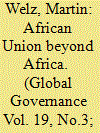

|
|
|
|
|
| Publication |
2013.
|
| Summary/Abstract |
This article explores the motives and means of the African Union and its member states for engaging in governance beyond Africa, and shows the leeway and limits the African organization faces in this regard. Two questions are at the center of the article. Is the AU successful in influencing governance beyond Africa? And what explains its success or failure? Three case studies form the article's empirical background: a study of the 2005 discussion about a reform of the UN Security Council; a study of the negotiations during the Climate Change Conference in Copenhagen in 2009; and, finally, a study of the attempt to defer the International Criminal Court's arrest warrant against Sudanese president Omar al-Bashir in 2009. The article argues that the AU can influence governance beyond Africa only if it is united, adopts realistic positions, and gains the support of more influential global players.
|
|
|
|
|
|
|
|
|
|
|
|
|
|
|
|
| 2 |
ID:
122309
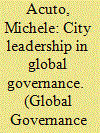

|
|
|
|
|
| Publication |
2013.
|
| Summary/Abstract |
The international society's lack of leadership is often blamed for many of the shortcomings in addressing global challenges. Yet this focus might have been on the wrong kind of leaders: rather than heads of state and diplomats, effective international responses might be better situated with the ordinary influence of city leaders. While capable of reaching beyond urban politics and developing transnational networks, mayors might represent a key hinge for the effective response to important challenges like climate change or sustainability. Against this scholarly oversight, this article demonstrates how mayors have a catalytic influence in global governance. Providing evidence of that role, it summarizes this agency through five nonexclusive features: regime promotion, governance hybridization, diplomatic entrepreneurship, normative mediation, and everyday international influence. Relying on the vast variety of city-led initiatives spawned in the past few decades, this article demands greater attention for the pivotal positioning of city leaders in global governance.
|
|
|
|
|
|
|
|
|
|
|
|
|
|
|
|
| 3 |
ID:
122307
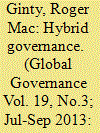

|
|
|
|
|
| Publication |
2013.
|
| Summary/Abstract |
Based on fieldwork interviews, this article examines the internationally sponsored good governance reforms in Georgia in the wake of the 2003 Rose Revolution. In one reading, the consolidation of power around the president can be seen as a failure of the good governance agenda. The article argues, however, that rather than using the success/failure binary to judge Georgia, it can be seen as a hybrid political order. Using an adapted four-part model of hybridization, the article examines the complex mix of international, local, and transnational dynamics that combine to produce hybrid governance.
|
|
|
|
|
|
|
|
|
|
|
|
|
|
|
|
| 4 |
ID:
122303


|
|
|
|
|
| Publication |
2013.
|
| Summary/Abstract |
The speed with which international organizations establish peace operations impacts prospects for sustainable peace. This article explains why some organizations take longer than others to answer calls for intervention. It identifies the role of informal relations in a literature that has long favored formality and challenges realist assumptions that intergovernmental decisionmaking depends strictly on national interests. Based on personal interviews with fifty ambassadors at four regional organizations, the article shows that differences in response rates largely depend on the strength of interpersonal relations among decisionmakers. Despite having superior funding, the European Union remains the slowest organization to react because of its highly formalistic culture. Informal bonds of trust help account for the speed with which organizations are able to respond to crises.
|
|
|
|
|
|
|
|
|
|
|
|
|
|
|
|
| 5 |
ID:
122304
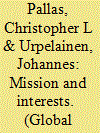

|
|
|
|
|
| Publication |
2013.
|
| Summary/Abstract |
International advocacy campaigns allow the concerns of disadvantaged groups in developing countries to reach policymakers. However, recent research has challenged the motivations of the Northern nongovernmental organizations involved and raised concerns about the impacts of North-South NGO partnerships on Southern NGO control. This article addresses these concerns by developing a typology of NGOs based on their financial incentives and the rigidity with which they adhere to their established organizational mission. It then models interactions between NGOs of different types as a strategic game. In the game, NGOs decide whether to enter international campaigns and, if so, manage campaign function to maximize payoff. "Participation-oriented" Northern NGOs, whose supporters reward them for undertaking advocacy, were found to run lengthy but ineffective campaigns and focus on publicity. "Outcome-oriented" groups, whose supporters reward them for measurable achievement, were found to generate higher campaign intensity but exit after either early victories or costly difficulties. The model is illustrated with a comparative analysis of two different campaigns regarding the Narmada Dam project.
|
|
|
|
|
|
|
|
|
|
|
|
|
|
|
|
| 6 |
ID:
122302


|
|
|
|
|
| Publication |
2013.
|
| Summary/Abstract |
More than any country in this century, Turkey has raised its profile as a regional and global political actor. It has achieved economic success and political stability under the leadership of the Justice and Development Party (AKP), and its charismatic prime minister, Recep Tayyip Erdogan. This rise of Turkish multilateralism has been more recently challenged by the blocking of its effort to join the European Union and by the rising tensions experienced in its relations with neighboring Syria. Turkey remains a crucial actor with considerable regional and extraregional influence.
|
|
|
|
|
|
|
|
|
|
|
|
|
|
|
|
| 7 |
ID:
122308
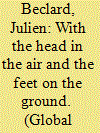

|
|
|
|
|
| Publication |
2013.
|
| Summary/Abstract |
Starting with the assumption that the European Union has increasingly tended to present its major space achievements as a substantial contribution to a larger and more ambitious project of construction and legitimization of a political actor (common foreign and security policy/European security and defense policy), this study deals with the EU's international actorness regarding global space governance. Different criteria (authority, autonomy, and coherence) have been selected in order to measure the level of international actorness in a given sector. This original grid of analysis has been systematically tested on the EU in order to conclude if the EU is an actor in the space field or if it is simply present in the field.
|
|
|
|
|
|
|
|
|
|
|
|
|
|
|
|
|
|
|
|
|